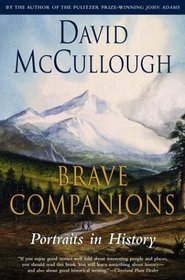Helpful Score: 6
This is a delightful, but remarkably thin historical volume from David McCullough who's biographies of John Adams, Teddy Roosevelt and Truman made these remarkable men more accessable to us than any other writer. This book presents short profiles of men McCullough sees as having shaped this country.
Helpful Score: 4
Excellent book! Of course, well written...McCullough never disappoints. But so many times I found myself thinking, "well, who knew?" Now I know...and you should too.
I enjoyed this. History wasn't like this in school!
As usual, an absolutely fantastic, eminently-readable history book from David McCullough, touching on everything from the Brooklyn Bridge to pioneering pilots to the eccentric, wealthy Rothschild descendant who devoted her life to studying insects. A wonderful book.
To say I am a fan of McCullough is an understatement. I have read most of his books and enjoyed them immensely and would find it difficult to pick which of them I liked best.
I found most of "Brave Companions" very interesting reading. However, I feel the final essays in this book leave much to be desired and wished I had just skipped over them. In fact, some of them I just ended up scanning. And frankly, if in the little time I have left on Earth I never again read anything about photographer David Plowden, whom McCullough greatly admires, I will die a happy man.
One piece of trivia I picked up in the essay on the Panama Canal was something I had never come across in any of the books I read about this great engineering project was the fate of the many workers who died from tropical diseases and other hazards. Here is what McCullough reports on pages 97-98:
"Since a large percentage of the dead men had no known next of kin, no permanent address, often not even a known last name, it was decided to pickle their bodies in large barrels, then sell them in wholesale lots. The result was a thriving trade with medical schools around the world, the proceeds going to finance a small railroad hospital in Colon."
Considering last year's expose of a Texas hospital selling the bodies and body parts of deceased patients, and the furor it caused, I doubt this is something the U.S. Canal Commission could be proud of. Better to have buried them in decency. And I say this even though I am listed as an organ donor on my driver's license.
I found most of "Brave Companions" very interesting reading. However, I feel the final essays in this book leave much to be desired and wished I had just skipped over them. In fact, some of them I just ended up scanning. And frankly, if in the little time I have left on Earth I never again read anything about photographer David Plowden, whom McCullough greatly admires, I will die a happy man.
One piece of trivia I picked up in the essay on the Panama Canal was something I had never come across in any of the books I read about this great engineering project was the fate of the many workers who died from tropical diseases and other hazards. Here is what McCullough reports on pages 97-98:
"Since a large percentage of the dead men had no known next of kin, no permanent address, often not even a known last name, it was decided to pickle their bodies in large barrels, then sell them in wholesale lots. The result was a thriving trade with medical schools around the world, the proceeds going to finance a small railroad hospital in Colon."
Considering last year's expose of a Texas hospital selling the bodies and body parts of deceased patients, and the furor it caused, I doubt this is something the U.S. Canal Commission could be proud of. Better to have buried them in decency. And I say this even though I am listed as an organ donor on my driver's license.
17 short pieces in 226 pages, quite different from each other (the ones I read), no real overarching theme, which is just fine.




![header=[] body=[Get a free book credit right now by joining the club and listing 5 books you have and are willing to share with other members!] Help icon](/images/question.gif?v=52444873)
